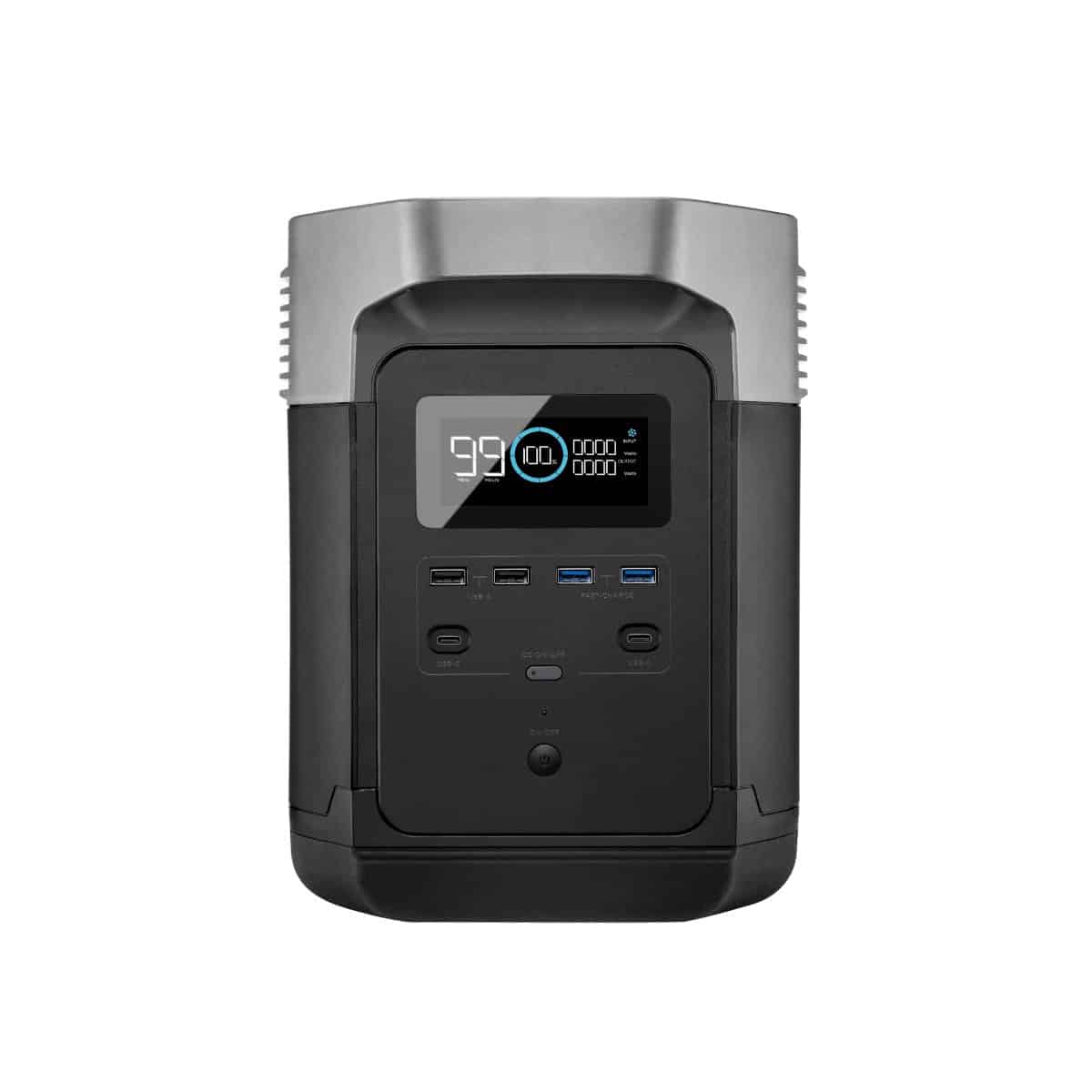There’s no off-season for blackouts. In the summer, high winds and overloaded grids result in unintentional outages; fires and floods result in intentional outages. Having an independent power source is a great way to stay in control of your electricity no matter what happens. A portable power station provides battery power during a blackout, but even then, you’ll still have to be smart about your energy usage.
We’ve come up with these energy-related tips for riding out a summer power outage – whether you have a portable power station or not.
Things to do Now
Preparing for expected and unexpected blackouts.
Stay informed. Loss of power may indicate the need to evacuate or find shelter, but unless you have backup power for your Wi-Fi router, getting information may be trickier. Those of you in the US can stay in the know with NOAA radios, WEA text messages, and a handful of apps. See how each relies on power.
Radio: An extended blackout in your area may wipe out surrounding cell towers, but radio towers are generally further away and may not be affected.
Apps: You’re in control of the information you want, but mobile internet may be slow during crises, using more battery power as you wait with your screen on. With a Wi-Fi router plugged into a battery, home internet might be available if your internet providers have generators.
Text: More reliable than apps because they don’t require as much bandwidth or battery power; information is stationary unlike rolling radio announcements, so it’s less screen use.
Where we can help: With a Wi-Fi router plugged into a backup battery, home internet might be available if your internet provider has power.
Consider home backup solutions. They can be as simple as a portable battery that keeps everyone’s phones charged and powers a few essentials like lamps, fans, and maybe even a coffee maker. There’s also battery backup solutions that have enough capacity to run much bigger appliances for extended periods – either by extension cords or by integrating them to your home’s wiring. Remember that trying to save a bit by doing home wiring integration yourself poses a risk for you and workers restoring power after a blackout.
Where we can help: EcoFlow offers a range of portable power stations suited to everything from keeping personal devices topped off to power your whole home.
Know how much energy you use. Battery technology has come a long way, but you might not realize how much power your appliances draw from the grid. Energy consumption can’t be judged on size. 1 kilowatt-hour can run a refrigerator for 24 hours, but a blow dryer will go through that in 45 minutes. Triage ahead of time by checking how long your particular devices draw from a battery. Keep in mind that it’s not as simple as saying a 3000 watt-hour battery can run a 300-watt device for 10 hours; energy gets used from DC to AC inversion and from the portable power station’s own consumption. EcoFlow’s portable power stations calculate all of this automatically and display an estimate in days, hours, or minutes.
Where we can help: EcoFlow’s portable power stations calculate all of this automatically and display an estimate in days, hours, or minutes.
DC Power. Batteries store power in DC, but wall outlets are in AC. Going from DC to AC uses up power, which is unnecessary for things that can run on DC like phones, computers, and lights. Recharge your phone (even some laptops) from your portable power station’s USB outlet – which uses DC – instead of the wall outlet plugs. You may even look into getting lights that can power from a barrel plug or an iceless cooler that can run from a 12V car outlet.
Buy earplugs. An installed gas generator next to a bedroom window may be loud enough that it disturbs your sleep. You may not even know your neighbor owns a generator until there’s a power outage.
When it’s close
Preparing for expected blackouts
Fridge and freezer. Turn your fridge/freezer to the coldest setting. Fill empty spaces in your fridge and freezer with bottles of water while you’re still on grid power. If the power goes out, that water is better at fighting off rising temperatures than empty air space. Since meats and dairy in the fridge spoil after just four hours without power, consider moving them to the freezer. If ample backup power isn’t in your cards, keeping meals and medications in a cooler minimizes the need to open your fridge.
Well pump. If your home is relying on a well pump for its water supply, store water where you can. However, keep in mind that bathtubs may be the safest spot if your area is at risk of tornadoes or hurricanes.
Where we can help: EcoFlow DELTA Pro can be integrated to your home’s wiring through our EcoFlow Smart Home Panel, giving battery backup to a hardwired well pump.
Charge up. Top off anything that has a battery, especially portable power stations if you have one. Depending on the brand, it could take a few hours to recharge if you’re coming from a low battery.
Prep low-watt meals. Sorry, no recipes here. The general idea is to prepare your meals beforehand while you have grid power and then use backup power to reheat them during the outage. If you have a portable power station, consider something that can be put in the microwave, since they’re more efficient than air fryers and ovens.
If you have an EcoFlow. We recommend using your battery between 20% and 80% capacity to get the longest cycle life, but for emergencies, it’s as good a time as any to make sure your portable power station can charge to the 100% maximum and discharge to 0%. Also enable fast charging so you can recharge when the power comes on not knowing if it will go out again.
Generator safety. Find a place that is at least 15 feet from doors and windows, and keep windows downwind from the generator closed.
Once it hits
Preparing for the long haul
Remember to switch off ovens, irons, and anything else that could start a fire once power is restored to them
Minimal freezer usage. A full freezer can keep food for up to two days without power, as long as it’s not opened. If you don’t have a portable power station that can run your fridge/freezer, it may be best to not use the freezer part and to eat anything perishable in your fridge within 2–3 hours of power loss. If you do have a portable power station, remember to turn your fridge to one of the lowest settings to save those watt-hours for something else.
Where we can help: Most of our portable power stations can add extra hours to how long your fridge stays powered, so you won’t need to turn it to the lowest setting. You can still save your battery by freezing water ahead of time.
Flip the main breaker. If your home is at risk of being flooded or you plan to evac, flip the main breaker switch. This prevents a fire hazard as well as an electrical hazard for your family, your neighbors, and emergency crews.
Unplug everything. Unless your wall sockets have backup power – like you’d get with our EcoFlow Smart Home Panel – resumption of grid power may be preceded by a damaging power spike. To minimize your home’s strain on the downed grid, you can turn off all lights except one inside and one outside, just enough so that you and the linemen know when the power comes back on.
Landlines still work. Cell towers get overloaded when people lose access to their home Wi-Fi network, and it might be hard to get a call through. Landlines still work because they draw power from the jack, but you’ll need battery backup for your home phone if you want to use a wireless receiver.
Shelter options. It might be hard to imagine having to stay in a shelter for a while, but if it comes to that, you can look for shelters on the Red Cross website.

EcoFlow RIVER 2 Max
| 512Wh Capacity |
| 500W AC Output |
EcoFlow RIVER 2 Max is light enough to take it on outings.
Recommended for: Phones, laptops, small appliances

EcoFlow DELTA
| 1.26kWh Capacity |
| 1800W AC Output |
Our best-seller for blackouts, EcoFlow DELTA has enough capacity to weather the storm while being portable enough to lift easily.
Recommended for: Phones, laptops, small/medium appliance

EcoFlow DELTA Pro
| 3.6-25kWh Capacity |
| 3600-7200W AC Output |
Use almost any appliance during a blackout; EcoFlow DELTA Pro can handle it. Go full blast for days with add-on capacity.
Recommended for: Phones, laptops, all appliances, home wiring

